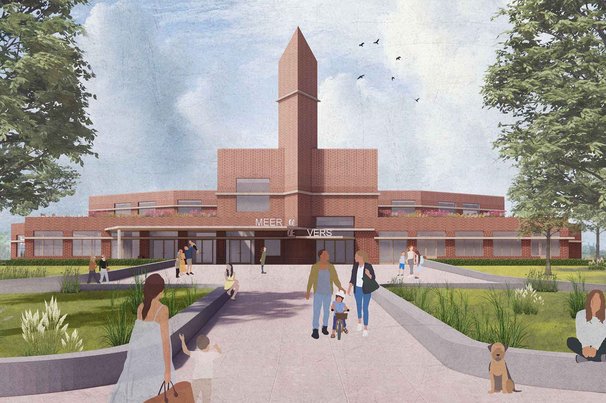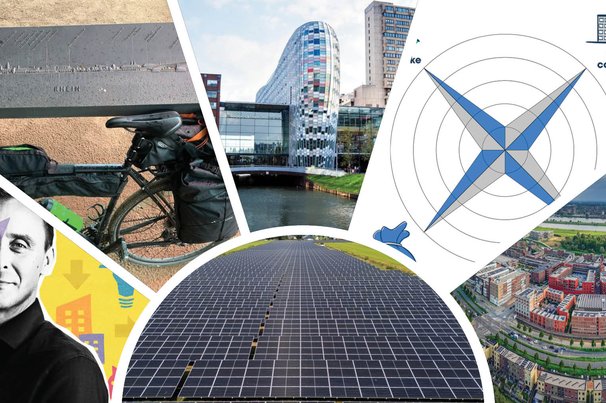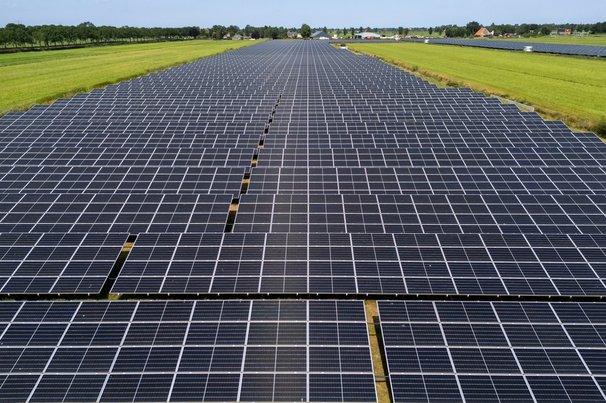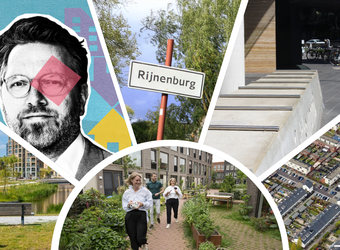Verslag Van de Zuiderzeewerken tot en met de Zandmotor: Nederlandse waterbouwkundig ingenieurs, ruimtelijk ontwerpers, planologen, beleidsmakers en bestuurders hebben zich gedurende de afgelopen honderd jaar in staat getoond volk, have en goed tegen het alomtegenwoordige water te beschermen en tegelijkertijd de delta van Rijn, Maas en Schelde almaar verder tot ontwikkeling te brengen. Zowel de strijd tegen het water als de noodzaak om te ‘leven met water’ maken van Nederland een laboratorium voor water- en deltabeheer. Eén groot ‘living lab’, waar een manier van werken is ontstaan en waar oplossingen worden gevonden die ook elders in de wereld van nut kunnen zijn: een Dutch Approach.
The Deltas & Ports of the Future Congress (28 January, 2016) was organised by the Deltas, Infrastructures & Mobility Initiative (DIMI) of TU Delft
Tijdens het congres 'Deltas & Ports of the Future' te Delft vroegen verschillende sprekers zich af in hoeverre die Nederlandse aanpak antwoorden biedt op huidige en toekomstige vraagstukken. Wat zijn de sterke punten? Wat kan of moet anders dan wel beter? De zorg om ruimtelijke kwaliteit, vinden zowel Han Meyer (hoogleraar Urbanism, TU Delft) als Henk Ovink (Nederlands Watergezant), is een typisch Nederlandse eigenschap die in de steeds dichter bebouwde delta’s niet mag ontbreken en benodigde transitities kan helpen bewerkstelligen. Inclusiviteit van ecologische waarden én processen in deltabeheer lijkt hoog op agenda te staan, maar volgens Johan van de Gronden (CEO WWF Nederland) zullen woorden toch echt in daden moeten worden omgezet. En staat de relatie tussen water, geopolitieke verhoudingen en armoede wel voldoende op het netvlies? Recent onderzoek van de Wereldbank wijst uit dat zonder gepaste maatregelen de gevolgen van klimaatverandering de armen het eerst en het zwaarst treffen. Dale Morris (Nederlandse ambassade in de VS) bevestigt de meerwaarde van de Nederlandse inbreng in verschillende projecten in de VS en houdt tegelijk een spiegel voor: ‘You really need to adapt yourself to the local context.’ Hieronder het Engelstalige artikel.
A hundred years ago, in 1916, a flooding disaster led to the construction of the Afsluitdijk, a 32 km long dam that sealed off an inland sea, the Zuiderzee. To this day, the Netherlands benefits from the freshwater reservoir that was thus created, the IJsselmeer or Lake IJssel. The Zuiderzee Works, a series of hydraulic engineering projects including the dam as well as extensive land reclamation, were an altogether impressive, daring and visionary feat.
During the twentieth century, the Dutch have mastered and perfected the art of water management as a combined effort, both integrating and innovating hydraulic engineering, design, planning and economic policy. This effort has not only made the Dutch delta the safest in the world, it has yielded the Dutch something of an international reputation as expert water managers. Their particular brand of civil engineering ability and multi-stakeholder planning and decision making, sometimes referred to as the Dutch Approach, is however based on twentieth century and even older premises. To what extent are they still relevant? How are increasingly urbanised and exploited coastal areas and river basins worldwide best managed in the light of various economic, social and natural challenges? Keynote speakers say it is time to reconsider the Dutch Approach.
Changing context
After the Zuiderzee Works a series of barriers, dams and other infrastructural works called the Delta Works was begun subsequent to the flooding of part of Southwest Holland in 1953. The Delta Works drastically shortened the Dutch coastline and have served as engines of substantial economic, social and spatial transformation. They brought agricultural benefits and an even distribution of urban and economic growth through port development and improved connectivity. Safety and prosperity went hand in hand, explains Han Meyer, DIMI vice chairman and Professor of Theory and Methods of Urban Design at TU Delft. ‘But now, in a changing context, we need to develop new types of synergy between engineering, design, planning and economic policy.’ One such new type of synergy can be the assimilation of natural processes in engineering and design practice, as initiated by various public-private partnerships under the heading: Building with Nature. The preservation, application and restoration of ecological values can lead to a more sustainable development and management of deltaic areas, at home and abroad.
‘Combining rapid metropolisation with spatial quality could also be an engine for transformation provided by the Dutch’, says Meyer. Likewise, the shaping of a circular economy, the provision of a sustainable energy supply system and the invention of smart methods and measures to counter or adapt to the effects of climate change offer ample opportunities to keep the Dutch Approach innovative and competitive. The required innovations and smart combinations need to take place first and foremost in estuaries, coastlines and river banks, Meyer explains. There, the natural systems need to be strengthened in order to adapt.
Adaptive strategies
Integrating delta technology, spatial design and governance is ‘quite an assignment’, notes Cees Veerman, former Dutch Minister of Agriculture, Nature Management and Fisheries. The current Dutch Delta Programme, now being carried out, is a prime example of how the care for a safe delta can be integrated with economic and other concerns and organised for the long term: by looking ahead towards 2050 and beyond, and setting out an adaptive strategy. As former chairman of the Second Delta Commission, Veerman laid the foundation of the programme and is now actively advising governments abroad, in Myanmar, Vietnam and Bangladesh, on the development of integral and adaptive delta strategies. Various delta regions worldwide have reached their ‘tipping point’, he warns, at which they no longer expand through the accretion of sediment but, mostly through human impact, are eroding and subsiding in the face of sea level rise. ‘Innovations should be developed to mitigate the threats that these regions face, such as sediment nourishment strategies that enable the restoration of mangrove habitats. In developing such strategies, Dutch industry and consultants can play an important role.’
Safety and quality
Henk Ovink, Special Envoy for International Water Affairs for the Netherlands, recalls the Great of Fire of London of 1666, exactly 350 years ago, after which one third of the city was rebuilt over a period of fifty years. A common conception may be, he suggests, that designers, engineers and other professionals rush in, clean up the mess and create a better, futureproof situation. Ovink however believes it is primarily a matter of political will whether prevention of (future) catastrophes is at the top of the agenda of any (re)designing and (re)building project. As Dutch history shows, it took 200 years before plans made by the hydraulic engineer Leeghwater to pump dry and reclaim Lake Haarlemmermeer – which continually eroded and threatened the surrounding lands – were actually executed. He argues that, nevertheless, safety and quality are the premises of a Dutch tradition of prospering in a vulnerable delta, and that the sustained combination of these core values has generated many viable solutions.
Ovink underlines how crucial good water management actually is for economic development, health and well-being in general. Even without the effects of climate change, he explains, fresh water supplies are anything but self-evident and often badly managed; water stress is at the heart of many conflicts. ‘In fact, 90% of conflicts worldwide are water-related and affect 15% of local and regional GDP. In the next 50 years, 20% of the global population will be devastated by either a shortage or a surplus of water. At this moment, 50% of the world’s aquifers, the natural groundwater storage tanks, are beyond their tipping point.’ These issues also affect the Netherlands, Ovink says, ‘but we have the Delta Programme.’
According to the World Economic Forum, water crises are the number one global risk in terms of impact for the next decade. In second place is the failure to mitigate or adapt to climate change, an issue closely related to water management and urban development. ‘These issues mainly affect rapidly urbanising but vulnerable delta regions.’ Likelihood and impact of crises are increasing, Ovink concludes, but they are also interdependent. Both research and practice show that mitigation and adaptation strategies, based on an understanding of design, engineering and governance, can make a change for the better. ‘But for the Dutch Approach to succeed in the 21st century, at home and abroad, we need to change our approach.’ How? ‘By matching the need for long-term planning and short-term projects. By improving accountability and transparency in order to stimulate public and private financing. By making the process genuinely inclusive, and not just a matter of professionals talking to professionals.’ And last but not least: ‘by building institutional and non-institutional capacity.’
Climate change: a poverty multiplier?
If adaptive delta management in the Dutch manner is to succeed abroad, it should include a social-economic perspective on developing countries and emerging markets. Ending poverty and addressing climate change are the twinned subjects of a recent World Bank report: Shock Waves, Managing the Impacts of Climate Change on Poverty. Co-author Julie Rozenberg, economist at the World Bank Sustainable Development Group, explains that climate-related ‘shocks’ and stresses are an obstacle to poverty eradication. The weather already has a substantial negative impact on agriculture as a means of income and a food source, and climate change is likely to increase this impact. She also points out that, because poor people often live in high-risk areas such as flood prone areas or regions sensitive to droughts, they are extra vulnerable to natural disasters. With no money in the bank or access to credit they lose everything they have. Climate change will enhance this problem. The same goes for climate-related health risks.
‘We found that without development, if existing sustainability goals are not achieved, climate change effects could bring 120 million people to poverty by 2030.’ Rapid, inclusive and climate-informed development can prevent most, but not all climate change impacts on poverty. The report includes a number of recommendations on carrying through climate mitigation without slowing down poverty eradication, both in the short and long term. In general, delta planning and risk management are two sides of the same coin and strengthening natural systems can bring substantial improvement. ‘We have a window of opportunity.’
‘Adapt yourself to the local context’
In recent years the Dutch Approach has been applied in the wake of hurricanes Katrina and Sandy. Both in New Orleans and New York, and elsewhere in the US, Dutch water and spatial experts have helped design flood protection infrastructure and rebuild urban areas. Dale Morris, Senior Economist and Coordinator for Water and Climate Adaptation at the NL Embassy in the USA, has been involved in introducing and guiding this Dutch effort. Have the Dutch been visionary, relevant and helpful, he asks? Can they be arrogant and naive, he also wonders? As Dutch strengths he lists: a strong belief in the collective management of public space, a high level of awareness and the ability to act upon it, the skill of long-term planning. ‘A key Dutch quality is the ability to integrate scales, systems and disciplines, as is the willingness to experiment and fail. The Netherlands is a laboratory and you make good use of it.’
The USA, however, is a much bigger country, dealing with much harsher weather conditions and a variety of environmental hazards. ‘It is not unified and we have a very weird budget cycle’, says Morris, which makes it hard to integrate and think long-term. The Dutch effort in New Orleans has been successful in developing an inspiring vision on smart, resilient water management infrastructure resulting in a full-fledged urban water plan based on multi-layer analysis, Morris stresses, ‘because a group of smart minds were working outside the establishment, which only wanted to rebuild what was.’ Likewise the Rebuild by Design Competition of 2013, initiated after Hurricane Sandy hit the northeast USA, and the National Disaster Resilience Competition of 2015 introduced some Dutch qualities mentioned before. ‘Americans don’t work this way.’ So yes, Morris concludes, it pays to “Bring in the Dutch”. But now that the plans and contracts are there, ‘will the innovation be squeezed out’, he wonders? Are the benefits long-term? Moreover, Morris urgently advises the Dutch not to come in, look around and say: “You need what we've done at home”. ‘This may get you into trouble. What the Americans need is inspiration and the application of your vision to their problem. You really need to adapt yourself to the local context.’
Practice what you preach
The last keynote speaker is Johan van de Gronden, CEO of WWF in the Netherlands. He suggests that Dutch integral delta management, balancing engineering and ecosystems, can be interpreted as a unique selling point, eagerly deployed by public authorities, businesses and knowledge institutions alike. However, in terms of biodiversity the Netherlands ranks low internationally. ‘According to one planning bureau we may have lost up 85% of the species that once inhabited our fertile delta.’ There is room for mild optimism, Gronden admits, ‘as recent decades show a recovery of 15%. Tremendous progress has been made in the return of freshwater species, partly thanks to efforts like the Living Rivers plan (Levende rivieren) of the 1990’s.’
On the other hand, the success of the Netherlands as an agricultural export nation comes with huge ecological decline. ‘A large area of the country is as good as dead in terms of natural value.’ Also, research shows that ecological restoration as part of working in an integrated fashion is far from common practice, more of an afterthought, ‘although there are a few gems that spark hope.’ And innovative semi-natural solutions for coastal protection such as the Sand Motor suggest engineers are on the right track. But should the Dutch not practice better what they preach? ‘We may challenge governments and counterpart organisations abroad to protect their ecosystems, but surely we need to do a great job back home, in order to serve as an example.’ Van Gronden rounds off with a threefold proposition: the conception of a national Deltaplan for biodiversity restoration, at least one Cabinet voice on environmental protection and restoration, and a portfolio of genuinely integrated, ecologically sound delta management examples abroad.
Cover: ‘2016.02.05_Delta dilemmas: reconsidering the Dutch approach’





